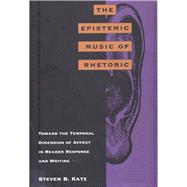
| Preface | p. xi |
| A Note on the Appendixes and Endnotes | p. xiv |
| Introduction: Epistemic Theories, Spatial Metaphors, and the Problem of Describing Emotion | p. i |
| Reader Response Criticism, Writing, and the New Physics: the Spatial Limits of Affective Indeterminacy | p. 17 |
| Cicero as Reader Response Critic: Sophistic Rhetoric and the Epistemic Music of Rhetoric | p. 80 |
| The Music of Language: the Temporal Dimension of Affective Experience | p. 135 |
| toward a Conclusion of Indeterminacy: Reader Response as a Rhetoric of Musical Performance | p. 177 |
| Postscript: Teaching Indeterminacy? Methods, Fears, Politics, Curricula, and the Problem of Epistemology | p. 220 |
| The Problem of Affect and Interpretation: Allen Tate Versus the Logical Positivists | p. 239 |
| Philosophical Bloodlines: the Sophistic Ontology of Cicero's Epistemology | p. 246 |
| Analysis, Interpretation, and the Aurality of Imitation: a Reconsideration | p. 256 |
| Appendix D | p. 268 |
| Notes | p. 277 |
| Works Cited | p. 323 |
| Index | p. 343 |
| Table of Contents provided by Publisher. All Rights Reserved. |
The New copy of this book will include any supplemental materials advertised. Please check the title of the book to determine if it should include any access cards, study guides, lab manuals, CDs, etc.
The Used, Rental and eBook copies of this book are not guaranteed to include any supplemental materials. Typically, only the book itself is included. This is true even if the title states it includes any access cards, study guides, lab manuals, CDs, etc.